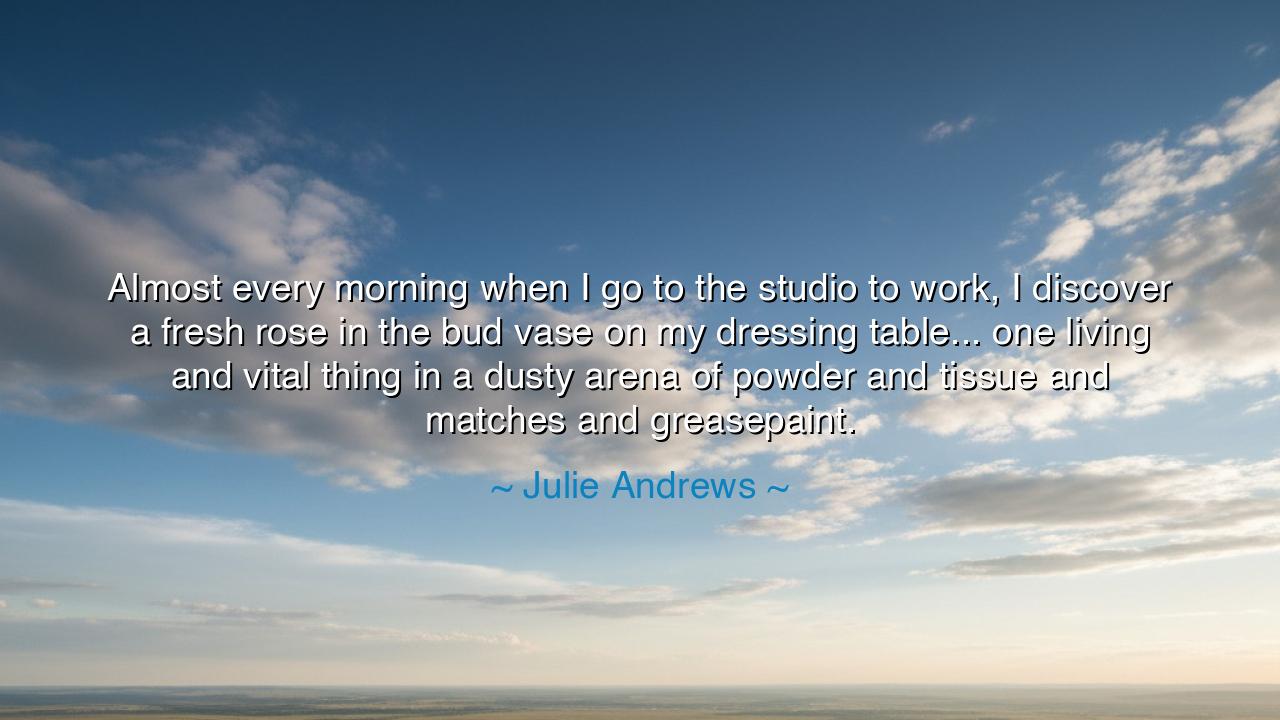
Almost every morning when I go to the studio to work, I discover
Almost every morning when I go to the studio to work, I discover a fresh rose in the bud vase on my dressing table... one living and vital thing in a dusty arena of powder and tissue and matches and greasepaint.






When Julie Andrews reflected, “Almost every morning when I go to the studio to work, I discover a fresh rose in the bud vase on my dressing table… one living and vital thing in a dusty arena of powder and tissue and matches and greasepaint,” she was not merely describing a flower, but an oasis of truth amid artifice. Her words remind us that in a world of illusion, painted faces, and carefully crafted roles, the simplest gesture of life—a rose in bloom—becomes a symbol of purity, grounding, and hope.
The origin of this quote lies in Andrews’ life as a performer in the demanding world of theater and film, where days were consumed with rehearsals, costumes, and makeup. The dressing room, filled with powder and greasepaint, represents the machinery of performance, the transformation of the self into characters beloved by the audience. But the rose, placed with quiet devotion, stood as a reminder that beneath the masks and lights there is still life, fragile yet radiant. Someone cared enough to bring beauty into a place of routine, and in that small act, humanity revealed itself.
This moment echoes the wisdom of the ancients. In ancient Rome, gladiators prepared themselves in dusty chambers before entering the arena, surrounded by weapons and armor. Yet some wore charms, or carried tokens from loved ones—reminders that they were not mere spectacles, but living men with hearts and souls. Similarly, Andrews’ rose was a charm, a small but powerful affirmation that life and love endure even in the midst of labor, sweat, and performance.
There is also a profound lesson here about the power of small acts. The giver of the rose may not have been famous, nor their act proclaimed, yet their simple ritual transformed a harsh space into one touched by grace. The rose’s presence lifted the spirit, reminding Andrews daily of vitality and tenderness. In this we see the truth: greatness does not always come from grand gestures, but from quiet constancy, from the deliberate act of placing beauty in the path of another.
At the heart of this reflection lies the tension between appearance and reality. The “dusty arena of powder and tissue and matches and greasepaint” symbolizes illusion, the artificial tools used to construct beauty for the audience. The rose, however, is genuine, living, unadorned. It is a reminder that while artifice may dazzle, the soul longs for authenticity. This duality is not condemnation, but balance: art and illusion have their place, but life itself must always remain at the center.
The lesson for us is timeless: seek the roses in your own life. Amid your routines, your obligations, your masks and roles, do not forget to anchor yourself in what is living, vital, and real. Place symbols of life in your daily path—whether they be flowers, kind words, or moments of silence—and let them remind you of your humanity. Equally, become the giver of such roses. Do not underestimate the power of a small, thoughtful gesture to transform the weary spaces of another’s life.
So let us remember Julie Andrews’ words: “one living and vital thing in a dusty arena.” Let them remind us that life is always more than the roles we play, the masks we wear, or the stages we inhabit. In the end, what endures is not the greasepaint of performance, but the fragrance of the rose—acts of love, authenticity, and beauty that shine amid the dust. Seek them, cherish them, and become them for others. For it is in such small blossoms that we find the eternal.






AAdministratorAdministrator
Welcome, honored guests. Please leave a comment, we will respond soon